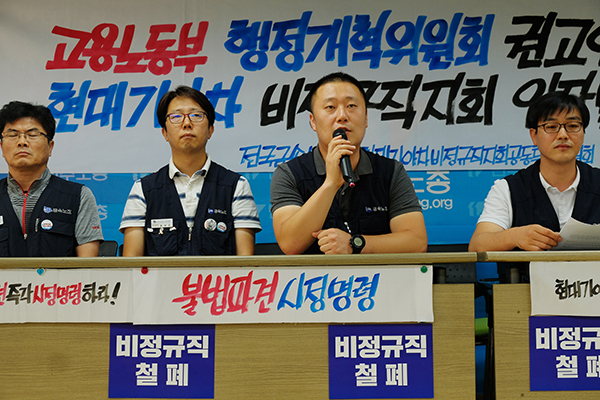
The labor inspection administration of the Ministry of Employment and Labor(MOEL) moves backwards. Amid rising criticism against the measures taken by the MOEL with the expansion of the grace period for the punishment for the violation of working hours and minimum wage, the basis of labor inspection the government has set up at its initial stages even falters.
According to the documents for the meeting between the MOEL and the Environment and Labor Committee of the National Assembly on January 6, the measure to strengthen the labor inspection which had been planned by the former MOEL Minister Kim Young-joo was effectively rescinded. In January last year, MOEL gave a presentation to the Prime Minister that included the reform measure for the labor inspection administration. The key points were the preventive labor inspection, the enhanced effectiveness of labor inspection, and the capacity building for labor inspectors.
At the time, MOEL revealed that it will shift the current focus on the ‘correction order’ to the ‘principle of judicial punishment’ for the violation of the labor laws in order to enhance the effectiveness of labor inspection. MOEL does not make prompt punishments for the employers who were found to have violated the law in the labor inspection. It offers two weeks to a month for the employers to implement the correction order. If the correction is yet to be made, measures for the judicial punishment are taken. Rarely, there are the cases that prompt judicial punishments are made without going through the correction order, if the violations are serious and malign.
The correction order first has an aspect in weighing its approach to relieve the victimized workers, because, when the employers are punished, it takes time until the workers are restored to their original conditions.
However, critics say that the cases the employers who avoided the judicial punishment repeatedly violate the law remain unabated. No legal basis is found in the labor related laws including the Labor Standards Act to issue the correction order, but MOEL issues the correction order in accordance with its regulations for labor inspectors. This is the reason why MOEL made a presentation to Prime Minister in January last year on the emphasis on the principle of judicial punishment.
However, MOEL has not implemented the plan in the MOEL’s activity report. Labor Minister Lee Jae-kap submitted a written reply to the parliamentary hearing for his appointment in September last year that “MOEL studied (the judicial punishment first) at the level of strengthening the effectiveness of labor inspection for the protection of workers’ interests and rights, and the expansion of the punishment to six months for the violation of working hour cuts in related to the Labor Standards Act does not comply with the MOEL’s activity report.”
A related MOEL official said in a telephone communication with the Labor Today that “it is true MOEL has studied a stern measure against the violation of the labor related laws (in its activity report last year).” It meant that although MOEL has included the measure in the activity report, it was only studied without making a decision or its implementation.
What MOEL insists that it only studied the measure which was presented to Prime Minister and the press is less convincing. Rather, it is interpreted that MOEL has changed its policy direction pushed by the opposition of the business circle to the minimum wage hike and working hour cut.
Labor Minister Lee Jae-kap made an instruction to labor inspectors last month that “labor inspection next year should be carried out on the basis of voluntary correction moving away from the prosecution in violation of the labor related laws, taking into account the difficult business conditions and employment indicators facing the employers.” It means that of about 25,000 total labor inspections, about 20,000 regular labor inspections will be provided with an opportunity for the employers to make a correction one month to two months before the implementation of regular labor inspections. The awareness raising period of one month to two months has been expanded much more than the current ten days specified in the duty rules for labor inspectors.
The MOEL’s move also collides with the recommendation made by the Employment and Labor Administration Reform Committee that sudden labor inspections shall be conducted in principle. When the employers are caught in labor inspection for their law violation, the correction order is normally issued for most of the cases. It seems that an additional chance for the correction will be provided. MOEL explained that “it is not a duplication of correction orders but an opportunity is provided for the employers to voluntarily check and improve the conditions.”
However, it seems difficult for MOEL to avoid a criticism that the reform for the labor inspection administration is retreating. It overshadows the objective of the large increase of labor inspectors. The government has reinforced the labor inspection with 765 new recruits up until last year from 2017, and this year it will recruit 413 labor inspectors more.
Lee Jong-soo, a labor attorney who also participated in the Employment and Labor Administration Reform Committee said that “MOEL’s labor inspection direction is teetering on the economic conditions.” “The labor reform policies such as the minimum wage hike, working hour cut and the job regularization in the public sector would be moving backwards,” he continued with his concerns.
reported by Kim Hak-tae
translated by Kim Sung-jin

